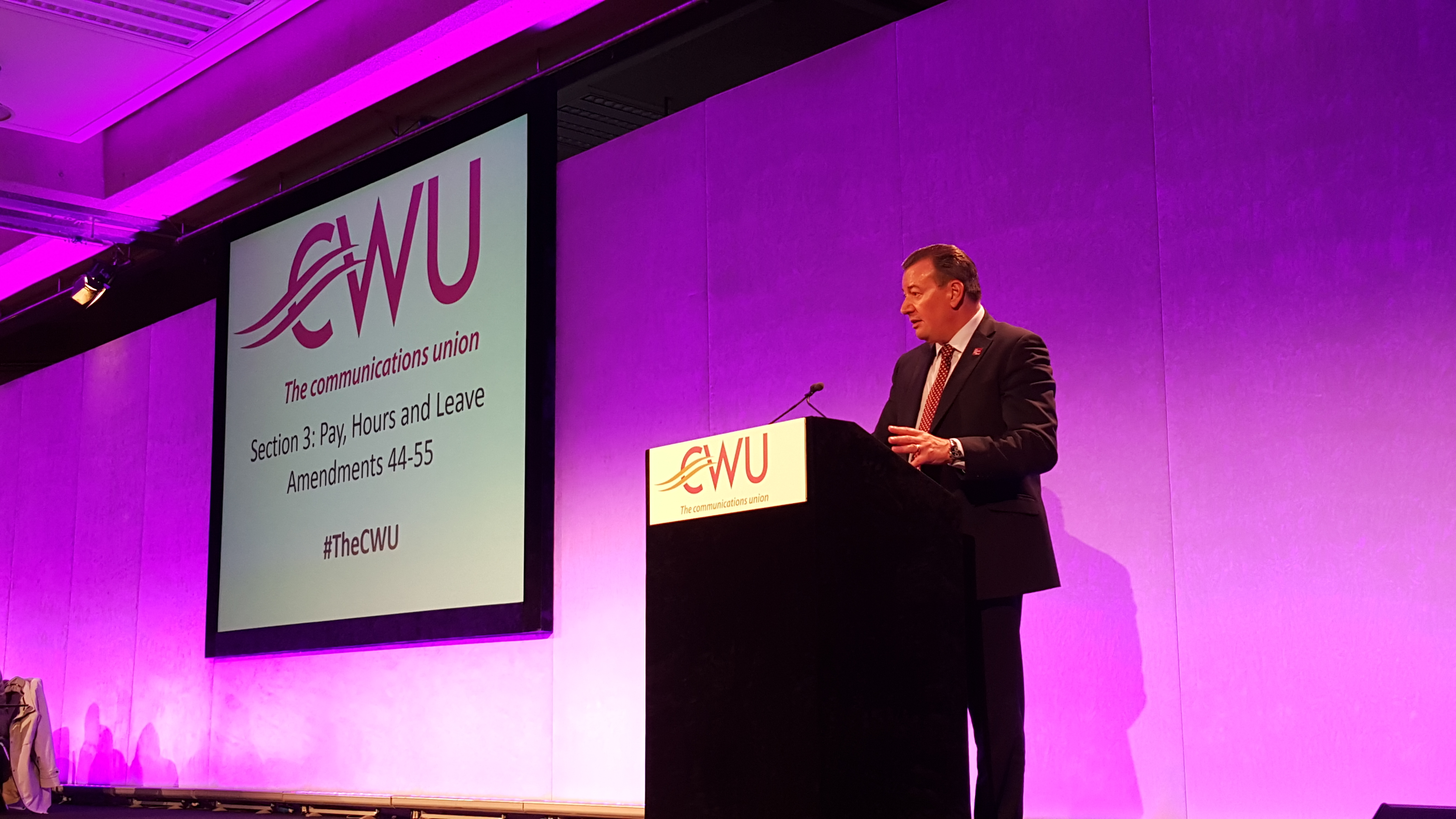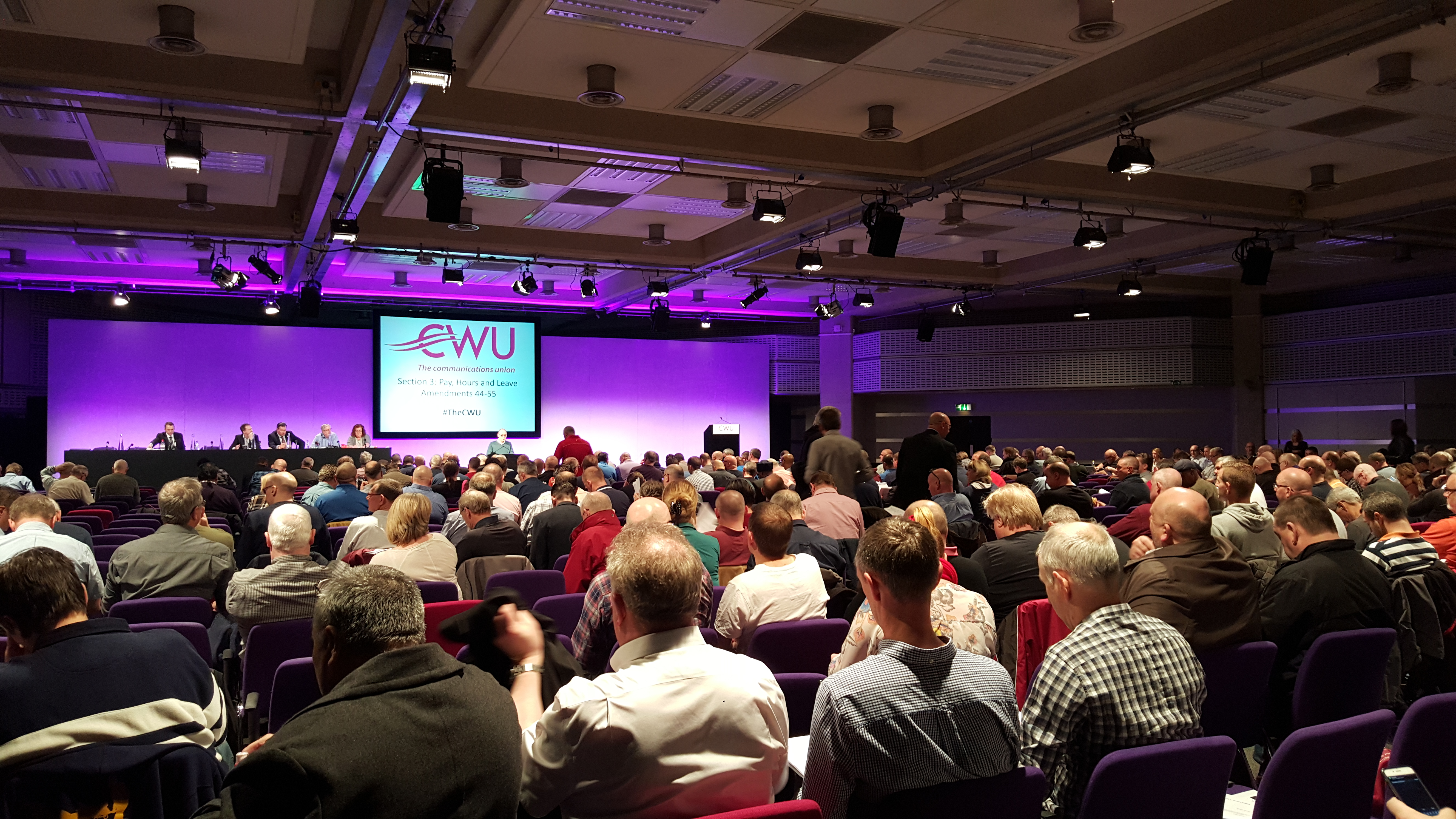CWU ‘drive for 35’
Postal March 24 2016A shorter working week will be a “priority aim” during the forthcoming national negotiations with Royal Mail, this week’s CWU postal policy forum decided.
Following a debate on the issue, delegates adopted policy aiming to achieve a 35-hour gross basic working week by 2020, with no reduction in pay.
The shorter week should be reached on a phased basis, with each annual step being linked to automation deployment and Royal Mail’s strategy, and with the intention of protecting full-time jobs going forward, the policy states.
 Speaking in favour of the position, deputy general secretary Terry Pullinger warned: “This will be a big issue with the business, but we will argue that we need to go forward on a mutual interest basis.”
Speaking in favour of the position, deputy general secretary Terry Pullinger warned: “This will be a big issue with the business, but we will argue that we need to go forward on a mutual interest basis.”
Terry added that there was a significant body of independent research that indicates that a shorter working week, linked to improvements in working practices and organisation, led to people being able to work better and more effectively while reducing fatigue and that the union would use this evidence in talks with the company.
On the issue of pay, the forum resolved that, if a one-year pay settlement was reached in the 2016 talks, then this should be ‘de-coupled’ from the range of other longer term issues under discussion.
During the debate on this issue, assistant secretary Davie Robertson explained that ‘de-coupling’, in the event of a one-year pay deal, would be the fairest way forward, because the longer-term issues will vary considerably across the different business groups and could take some considerable time to resolve.
A lengthy discussion took place over issues in delivery, with particular focus on company plans for ‘single-wave’ operation, ‘optimised mail preparation’ (OMP) and the possibility of increased delivery span.
Policy was adopted opposing the ‘single-wave’ idea as “artificially delaying the work in the network” and as a strategy “based on job losses and the creation of a predominately part-time flexible workforce.”
Policy was carried which committed the union to “explore an alternative strategy which allows work to be delivered from 7am on one or two or three deliveries.”
Such a strategy would “allow for bespoke services to be delivered later to grow the business and allow the opportunity to grow in the parcels business and protect full-time jobs.”
Assistant secretary Bob Gibson told the forum that “we’re all about getting the best deal for our members and, in light of the big impact on indoor workload, we must do something about delivery span.”
On OMP, policy agreed was to insist upon a “full national agreement” before any further deployment.

Protecting existing rights and agreements was also a high priority for delegates, who vowed to launch a national campaign, including an industrial action ballot, against any attempt by the business to close the defined benefit pension scheme, and also to secure a better pension settlement for those in the current defined contribution scheme.
And the forum also resolved to defend the MTSF agreement to ensure that “there is no depreciation of the terms and conditions which are covered by the MTFS agreement.”
Assistant secretary Ray Ellis reminded the audience that, over the 14 years since MTSF was introduced, no-one covered by the agreement had been made compulsorily redundant, which he described as “a proud achievement of this trade union and in stark contrast to the situation in wider industry.”
Congratulations were given to those who organised, took part in, and made a success of last October’s People’s Post Rally in Manchester. A similar event is planned for Birmingham in June and the forum pledged to “maximise attendance and participation, ensuring the People’s Post campaign goes from strength to strength.”
The union’s commitment to fight for full renationalisation was re-affirmed, and this will remain a “central tenet” of the People’s Post campaign going forward.
Summing up at the close of business, after a busy two-day event, Terry Pullinger thanked delegates for the “quality and thought” of their contributions to the debates and said: “We’ve united this union around policy.?Now we need to unite the whole membership behind securing the policies we’ve agreed.”
* Full details of policy documents agreed will be available to branches in due course.

